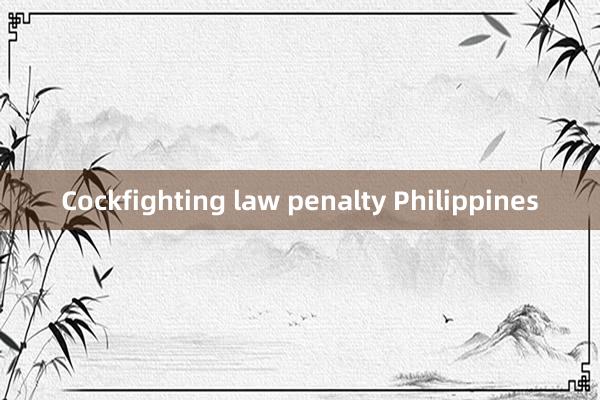
Cockfighting Law Penalty in the Philippines
Cockfighting, known as "sabong" in the Philippines, is a deeply rooted tradition with centuries-old cultural significance. However, in recent years, the government has intensified efforts to regulate and control this practice. As concerns over animal welfare, illegal gambling, and public safety have grown, the penalties for engaging in unlawful cockfighting activities have become increasingly severe. This article examines the laws surrounding cockfighting in the Philippines and the penalties imposed for violations.
For many Filipinos, cockfighting is not merely a form of entertainment but also a social and cultural activity. It has long been associated with community bonding and gatherings, particularly in rural areas where cockpits, or "sabungan," serve as a venue for social interaction. Participants often view cockfighting as a symbol of prestige, with high stakes involved in both pride and finances.
Despite its cultural importance, cockfighting has been controversial due to ethical concerns over animal cruelty and its potential to promote illegal gambling. These concerns have led to the Philippine government enacting strict regulations to ensure that cockfighting remains within legal boundaries.
Cockfighting in the Philippines is primarily regulated under Presidential Decree No. 449, also known as the Cockfighting Law of 1974. This law permits cockfighting under specific conditions, such as during licensed events and in licensed cockpits. However, the law strictly prohibits any form of cockfighting outside these regulated settings.
Additionally, Cuộc Bách Thí Hôm Nay – Khám Phá Cuộc Sống Từ Những Điều Nhỏ Nhặt Republic Act No. 8485, Vip Casino Games - Trải Nghiệm Sòng Bạc Hạng Sang known as the Animal Welfare Act of 1998, Go88 VIP - Sự lựa chọn hàng đầu cho người chơi cá cược trực tuyến plays a significant role in protecting animals, including gamecocks, from cruelty. This law mandates humane treatment and care for animals and imposes penalties on those who subject them to abuse, including cockfighting in illegal settings.
The penalties for participating in or organizing illegal cockfighting events are harsh. Under Presidential Decree No. 1602, which imposes stiffer penalties for gambling offenses, cockfighting outside of licensed arenas is considered an illegal gambling activity. The penalties for violating these laws vary depending on the severity of the offense.
Fines: Individuals caught participating in illegal cockfighting can be fined up to PHP 2,000. This may seem like a relatively small amount, but for those involved in repeated violations, the cumulative financial burden can become significant.
Imprisonment: More serious penalties include imprisonment ranging from 30 days to as much as 10 years, depending on the circumstances of the offense. For instance, those found guilty of organizing illegal cockfighting events can face imprisonment for a longer duration compared to those who simply attend these events.
Seizure of Property: Authorities may also confiscate any property or equipment used in illegal cockfighting, including gamecocks, weapons used during the fight, and the cockpit itself if it is not licensed.
Increased Penalties During the Pandemic: The rise of e-sabong, or online cockfighting, during the COVID-19 pandemic led to the implementation of even stricter regulations. The government imposed harsher penalties for illegal online cockfighting operations, which were unlicensed and often linked to illegal gambling networks. In 2022, then-President Rodrigo Duterte ordered the suspension of e-sabong operations after concerns over its social impact, including addiction, financial ruin, and even cases of abduction tied to the industry.
Local government units (LGUs) in the Philippines also play a significant role in regulating cockfighting. They are responsible for issuing licenses to cockpits and organizing local cockfighting events. LGUs ensure that the events comply with national laws and ordinances, providing additional layers of regulation and oversight.
In many provinces, cockfighting is only allowed on specific days, often during town fiestas or other significant community events. This helps limit the frequency of cockfighting activities and reduces the risk of illegal gambling and other related issues.
The regulation of cockfighting in the Philippines is a balancing act between preserving cultural traditions and addressing modern concerns about animal welfare and illegal gambling. While cockfighting remains a legal activity under regulated conditions, the government has taken significant steps to clamp down on unlawful cockfighting operations. The increasing penalties reflect a growing recognition of the need to protect animals from cruelty and to prevent the spread of illegal gambling activities.
Advocates for animal welfare continue to push for stricter enforcement of existing laws and the introduction of new legislation aimed at further curbing cockfighting. Some suggest that more robust public education campaigns about the ethical concerns surrounding cockfighting could reduce participation in illegal events.
Cockfighting remains a controversial practice in the Philippines, balancing between cultural significance and legal restrictions. While the government allows regulated cockfighting, the penalties for illegal activities are severe, ranging from fines and imprisonment to confiscation of property. The enforcement of these laws reflects the country’s growing commitment to addressing the ethical and legal issues associated with cockfighting, while still respecting its deep cultural roots.
PLDT 777 Casinowww.ezmiser.com